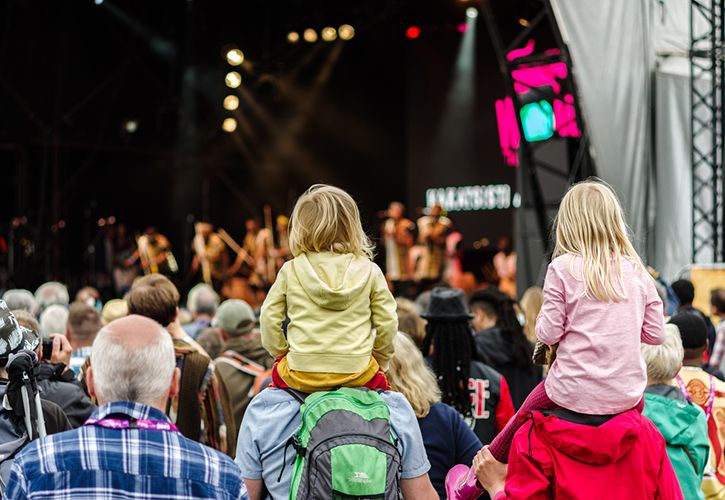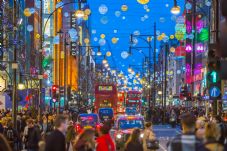UK DIY News
Experience Businesses Contribute £134bn To UK Economy

- 90 per cent of consumer-facing businesses believe that demand for memorable experiences is growing faster than demand for physical products
- UK consumers expect to spend an average of £3,322 on events, experiences and holidays between June and September
- Pride Month, the Paris 2024 Olympics and Glastonbury Festival are the events expected to have the greatest commercial impact
- Businesses that have made changes to provide more memorable consumer experiences report a 15 per cent average increase in revenue
- Barclays Consumer Spend data shows that entertainment and travel sectors have outpaced broader non-essential spending over the past year
- The ‘All to play for: winning with experience’ report combines hundreds of millions of customer transactions with consumer and business research to provide an in-depth view of experience-related spending trends
Modelling by Barclays and the Centre for Economics and Business Research (CEBR) reveals that the UK’s ‘Experience Economy’ – encompassing all businesses that provide consumers with unique and memorable experiences, such as holidays, live entertainment and sporting events – contributes an estimated £134bn1 to the broader UK economy, a figure greater than the GDP of Morocco2.
Between now and 2027, CEBR projects that the UK’s Experience Economy, which employs an estimated three million people1, will grow by an average of 2.6 per cent, surpassing the equivalent figure for the UK economy as a whole (1.6 per cent), to reach an estimated contribution of £146bn.
Much of this growth is fuelled by rising consumer appetite for experiences. Nine in 10 (90 per cent) of the hospitality, leisure and retail businesses who took part in the research believe that consumer demand for memorable experiences is growing faster than demand for physical products3, and a similar proportion (91 per cent) have observed that consumers still prioritise spending on memorable experiences even when money is tight.
Looking at how this will play out over the summer, Brits are predicted to spend a total of £178bn4 on ‘Experience Economy’ activities, between June and September, averaging £3,322 per person (median consumer estimate: £701). Individually, almost half (46 per cent) of the £3,322 average will go towards holidays abroad (£906) and staycations (£615). Other notable activities include live entertainment (£435), attending sports events (£295), and trips to the seaside (£143).
Businesses ride the experience economy wave
Almost all consumer-facing businesses (99 per cent) have made at least one change to capitalise on this behavioural shift. The most common strategies are investing in staff training (31 per cent), increasing their physical presence at event venues to engage directly with attendees (29 per cent), and launching new products that provide customers with memorable experiences (27 per cent). Businesses that have taken action say those changes resulted in a median average revenue increase of 15 per cent.
In the hospitality and leisure sector, 41 per cent are expanding the options for customers to personalise their experience to make the service more memorable, for example partnering with other local businesses to allow guests to build a personalised itinerary based on their interests. A similar proportion (40 per cent) are hosting themed events and special nights to attract customers looking for unique experiences.
Firms set to score big with summer of sports and entertainment
Nine in 10 (93 per cent) hospitality, leisure and retail business leaders expect that the sporting and cultural events coming up over the next few months will have a positive impact on their business. They predict that sports events (37 per cent), food and drink events (36 per cent) and holidays and tourism (36 per cent) will provide the most significant increase this summer, citing Pride Month (36 per cent), the Paris 2024 Olympics (35 per cent) and Glastonbury Festival (34 per cent) as the individual events that their business will benefit from the most. More generally, 91 per cent of businesses believe that the UK’s sporting, cultural and entertainment events help grow the economy by encouraging inbound tourism.
To capitalise on increased consumer demand during these major events, two fifths of retail decision-makers (40 per cent) say that their business designs window displays and in-store visuals that reflect sporting, cultural and entertainment events, while a third (33 per cent) develop exclusive promotional products that are only available for a limited period.
Consumers splash out as expectations surge
The new figures come after Barclays Consumer Spend data reveals that annual consumer spending on entertainment and travel has risen by 6.5 per cent and 11.6 per cent respectively year-on-year, outpacing the growth in non-essential spending more broadly (up 3.4 per cent)5.
Six in ten consumers (57 per cent) say they would rather spend money on a good experience than on buying material possessions, up 5 percentage points compared to corresponding Barclays research from 2018, and nearly two thirds (63 per cent) would rather tell people about something they have experienced rather than something they have bought. Similarly, four in 10 (44 per cent) are actively seeking out new and unique experiences to make the most of the summer – a figure that rises to 61 per cent for 18 to 34-year-olds.
However, businesses will have to raise the bar during the summer period to keep consumers engaged, as a fifth of Brits (18 per cent) say they have higher expectations of experiences this year compared to previous years. Half (50 per cent) of these consumers say that their standards are higher because the experiences they are going to are more in line with their passions and interests, and over a third (35 per cent) say that they expect better value for money as events cost more than they used to.
Rich Robinson, Head of Hospitality and Leisure at Barclays, said: “Brits are increasingly swapping shopping bags for shared moments, and experiences now make a heavyweight contribution to the UK economy as a whole. This trend is set to gather momentum as consumers look to splash out this summer on holidays, live entertainment and sports events, with retail, hospitality and leisure businesses ready to capitalise on this commercial opportunity.
“Yet as experiences become even more central in consumers’ lives, their expectations are set to soar even higher. To stay ahead of the curve, retailers, hospitality and leisure businesses will need to continue to innovate, ensuring their products and offerings are not just a one-hit wonder but are special enough to keep crowds coming back for more.”
Dr Peter Brooks, Chief Behavioural Scientist at Barclays, said: “The excitement of buying new furniture, a TV or smartphone tends to disappear relatively quickly as those items get normalised into our everyday lives. However, the memories created from spending on experiences, especially when it’s with family or friends, has been linked to longer-term boosts to happiness as the memories created live on when we reminisce about those shared moments.
“We’re witnessing a long-term behavioural shift that will see experiences like travel and live entertainment take up a greater share of our discretionary spending, certainly this summer but also into the foreseeable future.”
Sam Miley, Managing Economist and Forecasting Lead, CEBR, said: “Since the pandemic, there has been a notable shift in consumer preferences away from goods and towards services. This has brought considerable benefit to the Experience Economy, which is now far larger than its pre-Covid size.
“Such benefits are not expected to be short-lived. The experience economy is projected to expand at a faster rate than the economy as a whole in the coming years, making a significant contribution to overall growth.”
Source : Barclays
Image : ColobusYeti / iStock / 883054240
I find the news and articles they publish really useful and enjoy reading their views and commentary on the industry. It's the only source of quality, reliable information on our major customers and it's used regularly by myself and my team.











































